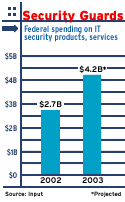Lucrative Legislation
Besides combining 22 federal agencies to create the Department of Homeland Security (DHS), the legislation includes the Federal Information Security Management Act, which requires federal agencies to conduct periodic IT security assessments and development of an agencywide information security program, among other provisions.
For the IT channel, homeland security opportunities start at the local police station and continue on up to the highest echelons of the U.S. government, said Lesley Taufer, CEO of The Boulder Corp., a Boulder, Colo.-based solution provider. The company has worked on data sharing, biometrics, single sign-on and other engagements with the Colorado Bureau of Investigation, the Colorado state police and Denver International Airport, she said, adding that since the Sept. 11 terrorist attacks these entities have been working with the federal government more closely than ever before and must be able to share data securely.

"Every agency we have talked to feels driven to get this [better data sharing to happen," Taufer said.
Initial homeland security dollars are being spent on physical security, but federal spending on IT security stands to pick up next year, said Ron Segal, president of Spectrum Systems, a Fairfax, Va.-based solution provider.
"We're laying the groundwork. We think we'll do well with both services and products," he said. "We believe it's a long-term market, not a Y2K thing that disappears."
Spectrum Systems has implemented several prototype biometric authentication solutions for federal agencies, which are showing a keen interest in using the technology for network access, Segal said. Other federal agencies also have had projects under way to upgrade systems, bolster redundancy and improve security, but the passage of the homeland security bill has given those efforts renewed vigor, he added.
To achieve the necessary coordination between its agencies, the DHS will require new security architectures, policies and standards, opening up opportunities for solution providers, said Barry Stauffer, chief information assurance officer at BAE Systems North America, a Rockville, Md.-based systems integrator and defense contractor.
In addition, the federal government has several cybersecurity initiatives in the works,aside from DHS,that bode well for the IT security sector over the long term, said Mark Small, senior vice president of government, health and education at Network Associates, a Santa Clara, Calif.-based security and network management vendor.
"I do believe it will heighten awareness [of IT security and could be a catalyst for the industry," Small said. Still, the boost likely won't happen until the second half of 2003, he said.
Pat Grillo, president and CEO of Atrion Communications Resources, a Branchburg, N.J.-based solution provider, agreed that the homeland security legislation is drawing more attention to security needs. "Anytime people start talking about security, it presents opportunities for us," he said.
Although the legislation doesn't specify an IT security budget for DHS, the technology budgets of the new department's agencies total $2.1 billion, excluding the costs of integrating the agencies, said Payton Smith, an analyst at Input, a market researcher. Input projects that federal spending on IT security products and services next year will reach $4.2 billion, up from $2.7 billion this year.